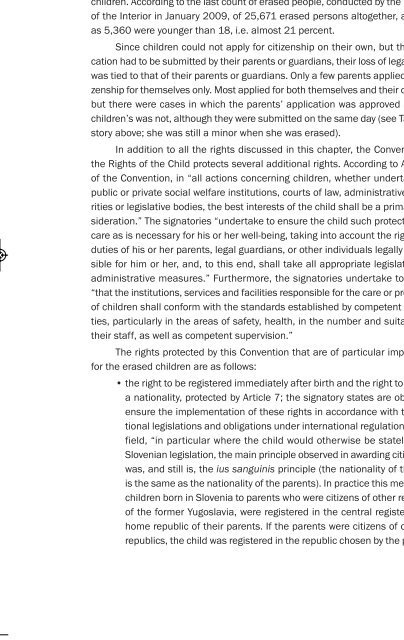The Scars of the Erasure_web
The Scars of the Erasure_web
The Scars of the Erasure_web
- No tags were found...
You also want an ePaper? Increase the reach of your titles
YUMPU automatically turns print PDFs into web optimized ePapers that Google loves.
<strong>Erasure</strong>_4a 10.1.11 20:29 Page 133THE ERASURE AS A VIOLATION OF LEGALLY PROTECTED HUMAN RIGHTS1335. Children’s rightsAs a vulnerable social group, children enjoy special protection, so accordingto international conventions, signatory states have additional obligations towardschildren. According to <strong>the</strong> last count <strong>of</strong> erased people, conducted by <strong>the</strong> Ministry<strong>of</strong> <strong>the</strong> Interior in January 2009, <strong>of</strong> 25,671 erased persons altoge<strong>the</strong>r, as manyas 5,360 were younger than 18, i.e. almost 21 percent.Since children could not apply for citizenship on <strong>the</strong>ir own, but <strong>the</strong> applicationhad to be submitted by <strong>the</strong>ir parents or guardians, <strong>the</strong>ir loss <strong>of</strong> legal statuswas tied to that <strong>of</strong> <strong>the</strong>ir parents or guardians. Only a few parents applied for citi -zenship for <strong>the</strong>mselves only. Most applied for both <strong>the</strong>mselves and <strong>the</strong>ir children,but <strong>the</strong>re were cases in which <strong>the</strong> parents’ application was approved and <strong>the</strong>children’s was not, although <strong>the</strong>y were submitted on <strong>the</strong> same day (see Tatjana’sstory above; she was still a minor when she was erased).In addition to all <strong>the</strong> rights discussed in this chapter, <strong>the</strong> Convention on<strong>the</strong> Rights <strong>of</strong> <strong>the</strong> Child protects several additional rights. According to Article 3<strong>of</strong> <strong>the</strong> Convention, in “all actions concerning children, whe<strong>the</strong>r undertaken bypublic or private social welfare institutions, courts <strong>of</strong> law, administrative autho -rities or legislative bodies, <strong>the</strong> best interests <strong>of</strong> <strong>the</strong> child shall be a primary consideration.”<strong>The</strong> signatories “undertake to ensure <strong>the</strong> child such protection andcare as is necessary for his or her well-being, taking into account <strong>the</strong> rights andduties <strong>of</strong> his or her parents, legal guardians, or o<strong>the</strong>r individuals legally responsiblefor him or her, and, to this end, shall take all appropriate legislative andadministrative measures.” Fur<strong>the</strong>rmore, <strong>the</strong> signatories undertake to ensure“that <strong>the</strong> institutions, services and facilities responsible for <strong>the</strong> care or protection<strong>of</strong> children shall conform with <strong>the</strong> standards established by competent authorities,particularly in <strong>the</strong> areas <strong>of</strong> safety, health, in <strong>the</strong> number and suitability <strong>of</strong><strong>the</strong>ir staff, as well as competent supervision.”<strong>The</strong> rights protected by this Convention that are <strong>of</strong> particular importancefor <strong>the</strong> erased children are as follows:• <strong>the</strong> right to be registered immediately after birth and <strong>the</strong> right to acquirea nationality, protected by Article 7; <strong>the</strong> signatory states are obliged toensure <strong>the</strong> implementation <strong>of</strong> <strong>the</strong>se rights in accordance with <strong>the</strong>ir nationallegislations and obligations under international regulations in thisfield, “in particular where <strong>the</strong> child would o<strong>the</strong>rwise be stateless.” InSlovenian legislation, <strong>the</strong> main principle observed in awarding citizenshipwas, and still is, <strong>the</strong> ius sanguinis principle (<strong>the</strong> nationality <strong>of</strong> <strong>the</strong> childis <strong>the</strong> same as <strong>the</strong> nationality <strong>of</strong> <strong>the</strong> parents). In practice this meant thatchildren born in Slovenia to parents who were citizens <strong>of</strong> o<strong>the</strong>r republics<strong>of</strong> <strong>the</strong> former Yugoslavia, were registered in <strong>the</strong> central register <strong>of</strong> <strong>the</strong>home republic <strong>of</strong> <strong>the</strong>ir parents. If <strong>the</strong> parents were citizens <strong>of</strong> differentrepublics, <strong>the</strong> child was registered in <strong>the</strong> republic chosen by <strong>the</strong> parents.


